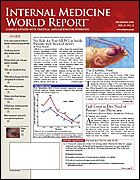Publication
Article
Internal Medicine World Report
Rifaximin Shows Activity Against C difficile-Associated Diarrhea
Author(s):
New Fluoroquinolones Show Promising Response to Resistance
Clostridium difficile
Las Vegas—Preliminary data indicate that oral rifaximin (Xifaxan) is effective treatment for –associated diarrhea (CDAD), said presenters at the American College of Gastroenterology meeting.
C difficile
With the rising incidence of infection, strains are becoming more virulent, and existing treatments have been associated with resistance and recurrence of diarrhea, prompting searches for new therapies.
C difficile
Metronidazole (Flagyl) and vancomycin (Vancocin) are the 2 most commonly used specific therapies for diarrhea associated with . Although most patients will respond to one of these drugs, diarrhea recurs in about ≥20% of patients. Also, fulminant disease has resulted in clinical sepsis, the need for colectomy, and even death.
C difficile
“We’re aiming to interrupt the cycle of multiple recurrences of ,” said Stuart Johnson, MD. “About 1 in 5 patients has a recurrence, and a smaller group has multiple recurrences, in whom the symptoms come back within days or weeks of stopping vancomycin.”
C difficile
A new epidemic strain of has emerged that is highly resistant to new fluoroquinolones with anaerobic activity, said Dr Johnson.
He presented a study in which a rifaximin “chaser” was used after a last course of vancomycin in 7 patients (all women) with multiple CDAD recurrences. Rifaximin was given empirically, 400 to 800 mg/day in 2 or 3 divided doses for 2 weeks, immediately after completing a suppressive course of vancomycin and before symptoms recurred.
Saccharomyces boulardii
All patients had 5 to 7 CDAD episodes over 5 to 14 months and had received multiple courses of metronidazole, vancomycin, vancomycin in combination with rifampin, or vancomycin with .
“Six of the seven patients had no further CDAD episodes when followed for 2 to 12 months,” said Dr Johnson of Loyola University, Chicago. The exception was a dialysis patient whose symptoms eventually resolved but who developed a resistant isolate.
Two patients required additional antibiotics for the treatment of urinary tract infections within weeks of stopping rifaximin, but neither had subsequent diarrhea.
In a prospective, open-label trial presented at the meeting, rifaximin was used as first-line therapy in 13 patients (5 men, 8 women) with CDAD. Of 8 patients who received 10 days of rifaximin, 7 responded to therapy at day 10 and had no relapses at 2 weeks.
Longer-term follow-up showed 1 confirmed case of CDAD at 52 days in a patient with a prolonged hospitalization after placement of a ventricular assist device. The other 5 patients had no relapses at a median follow-up of 162 days.
A third study of 19 patients with newly diagnosed or recurrent CDAD showed complete resolution of symptoms in 17 (89%) patients after they were treated with rifaximin, 400 mg, 2 or 3 times daily, for 10 to 14 days.
C difficile
Rifaximin concentrates in the gastrointestinal tract and has demonstrated in vitro activity against 110 isolates, including new epidemic strains, noted lead investigator Paul Berenbaum, MD.
A phase 3 study is currently underway comparing rifaximin with vancomycin for this condition.






